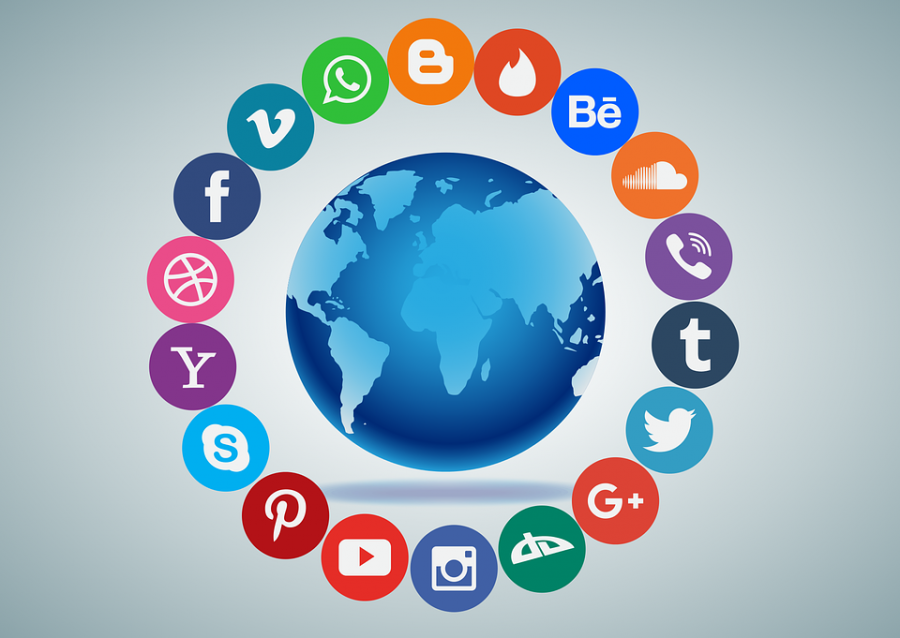Social Media: The Double Edged Sword
Various social media platforms are used around the world.
April 25, 2018
From MySpace to Twitter, social media platforms have been a way for people to express themselves.
Whether it’s to keep in touch with family members or to share things with friends, majority of teenagers have access to some form of social media.
Facebook, typically considered to be used only by older generations, is used among 71 percent of teens while the more modern app Instagram is used by 52 percent, according to a 2015 PEW research study. Adolescents tend to diversify their media usage.
“I use various social media for different reasons,” senior Spencer Mattson said. “I use Twitter to market myself. I use Instagram just to keep using it, I guess. I use snapchat because it’s faster than texting and I don’t use Facebook.
Around 92 percent of teenagers stated that they use the internet on a daily basis and 24 percent stated that they were constantly connected to the internet. Smartphones now allow adolescents to stay connected to social media 24/7, viewing other people’s lives constantly.
“One of the problems with social media is that everyone posts the best versions of themselves on social media. So everyone compares themselves, and what they know about themselves, to the best version of everyone else,” CHS Psychologist Clay Youngblood said. “Have you ever heard of the phrase: ‘Keeping up with the Joneses’? It’s an old phrase whereas years before social media, people would try and keep up with their friends and family… Social media is our version of that, but people are making those comparisons all day, everyday.”
According to Jill Emanuele, a clinical psychologist at the Child Mind Institute, children who view other people’s “perfect” lives can have a lower self-esteem and may have a harder time accepting their “less-than-perfect self”, as told to reporter Rae Jacobson at the CMI.
“When I see people who get so much attention for their post and all it is is a selfie, and [I see] how great their lives are, and I’m like ‘God, I wish I had that life’,” freshman Gabriel Bojorquez said.
The constant bombardment of social media among teens creates the environment for comparison. Dina Borzekowski, a professor at John Hopkins school of public health notes, believes that social media may have a stronger impact on an adolescent’s body image compared to traditional media, as told to the Park Nicollet Melrose Center.
“Sometimes people make it seem like their life is really awesome on Instagram. Or like my friends. One of my best friends, her Instagram is really pretty and it looks like she lives a great life but like, I know her personally,” Senior Yesenia Torres said. “I know her problems and I know her life isn’t perfect.”
From friends posting only the “perfect” pictures to celebrities chronicling their lives, adolescents are troubled by lower self-esteem because they don’t live up to the fake standards set by social media.
“I think celebrities nowadays have a bigger impact on how people view themselves, their self image, their self esteem. We have a lot more access to celebrities then we used to through social media,” Youngblood said. “On twitter, you can follow somebody and they could literally tweet what they’re doing all day long, whereas decades ago, that was an impossibility. The most access you would have was through a magazine or a tv show. I think today, social media is really having a big impact on self esteem, self awareness, and just how our identities are shaped.”
According to Uğur Gündüz, associate professor of communications at Istanbul University, an individual needs others to establish themselves. People tend to develop different identities through the use of social media, one that is separate from their actual person, as also stated in Jacobson’s article.
“I feel like a lot can happen through social media. I feel like a lot of people can get misinterpreted in ways. Like rumors can easily spread and people can be construed as something they’re totally not,” sophomore Hannah Bradley said. “Social media can change how you look at things or see things, but it’s probably not true.”



